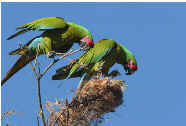
| Amazon Expedition Travel
|
 |
|
|
|

| User Functions
|
|
|
Don't have an account yet? Sign up as a New User
|
|

| Help support this site!
|
|
|
Help support this site... your donations are needed to support research, conservation, and rescue efforts.
|
|

|
 |
| Illegal Mexican Parrot Trade Targeted by New Ban |
 |
Thursday, October 02 2008 @ 03:39 AM UTC
Contributed by: Paul Brennan
Views: 9021
|

 Illegal Mexican Parrot Trade Targeted by New Ban Illegal Mexican Parrot Trade Targeted by New Ban
Alexis Okeowo in México City
for National Geographic News
October 2, 2008
A new permanent ban on parrot sales in Mexico may protect the country's exotic birds from a thriving illegal wildlife trade, conservationists say.
Mexico considers half of its 22 parrot species endangered, and all but two are protected by federal law.
But between 65,000 and 78,000 parrots and guacamayas—a bigger type of parrot—are captured illegally every year, and most of these birds die each year before reaching their intended buyers.
The government has been unable to control the clandestine capture and sale of the protected birds, environmentalists say.
The new ban—an amendment to Mexico's wildlife law—will eliminate the parrot and guacamaya market completely.
The law will go into effect when it is published in the official congressional diary, possibly by the end of October.
" … The whole trade is really a waste," said Juan Carlos Cantú Guzmán, director of programs for the conservation group Defenders of Wildlife Mexico, which published a report on the illegal parrot market in 2007 and supports the ban.
"Ninety percent of the bird species are in some category of risk, and most are in danger of extinction if nothing is done."
Legal or Illegal?
The Defenders of Wildlife Mexico report identified U.S. demand as a major driving force behind the illegal trade for some species, such as the yellow-naped parrot, which is found only in the Mexican state of Chiapas.
"In many cases, the destination of these birds are border cities like Tijuana and Ciudad Juárez to commercialize them in the United States," Javier Sosa, director of the wildlife program at Mexico's environmental protection agency, PROFEPA, said in an email.
(Related: "Wildlife Smuggling Boom Plaguing L.A., Authorities Say" [July 26, 2007].)
But most illegally captured parrots stay in Mexico, Defenders of Wildlife's Guzmán added. The parrots are dispersed to different distribution centers and then sent to countless markets across the country.
Mexico only allows the sale of parrots via legal channels, such as through a federally established conservation area or the regulated estates of bird-trapper and exporter unions.
Between 3,000 and 4,000 parrots are allowed for capture each year, according to government quotas.
But there is no efficient marking system to differentiate between legally and illegally captured birds, Sosa of PROFEPA said.
Especially at informal markets, the only method to differentiate between legally and illegally captured parrots is to check if a bird has a band around its leg. A band signifies a legally caught bird.
"It's very hard to monitor bird trappers. [The Defenders of Wildlife Mexico report] is the first time anyone has been able to get an estimate on the illegal trade of bird species," Guzmán said.
Little Oversight
The group's research found that Mexican environmental officials "had absolutely no effect on the illegal parrot trade," Guzmán added. Only 2 percent of trafficked parrots are confiscated by government officials each year.
Mexican unions also protect rights of professional bird trappers, who say they comply with government rules when capturing birds. The permanent ban has outraged many bird trappers.
Fidél Chavez Policarpio captures parrots legally for a living and sells them at México City's bustling Sonora Market.
"I capture the parrots in Vera Cruz [one of Mexico's coastal regions], and then usually have 20 to 30 customers a week when I return to the city," said Policarpio, who has been working in the parrot trade for 15 years.
Like other trappers, he delves into Mexico's forests armed with only a net, work he describes as "very difficult."
"It would be bad if they did [ban parrot sales]," Policarpio said. "My family and I need bird trapping to survive. I have children to take care of."
Parrot vendor Samuel Daniel Zarate has been selling the colorful birds nearly all of his life in México City, though he is not involved with the birds' capture.
He believes the legal sale of birds should still be allowed at markets such as Sonora, where the sale of exotic birds is booming.
"I have too many customers," Zarate said. "People here love parrots and guacamayas."
http://news.nationalgeographic.com/news/2008/10/0801002-parrot-trade.html
|
|
|
|

|

|

